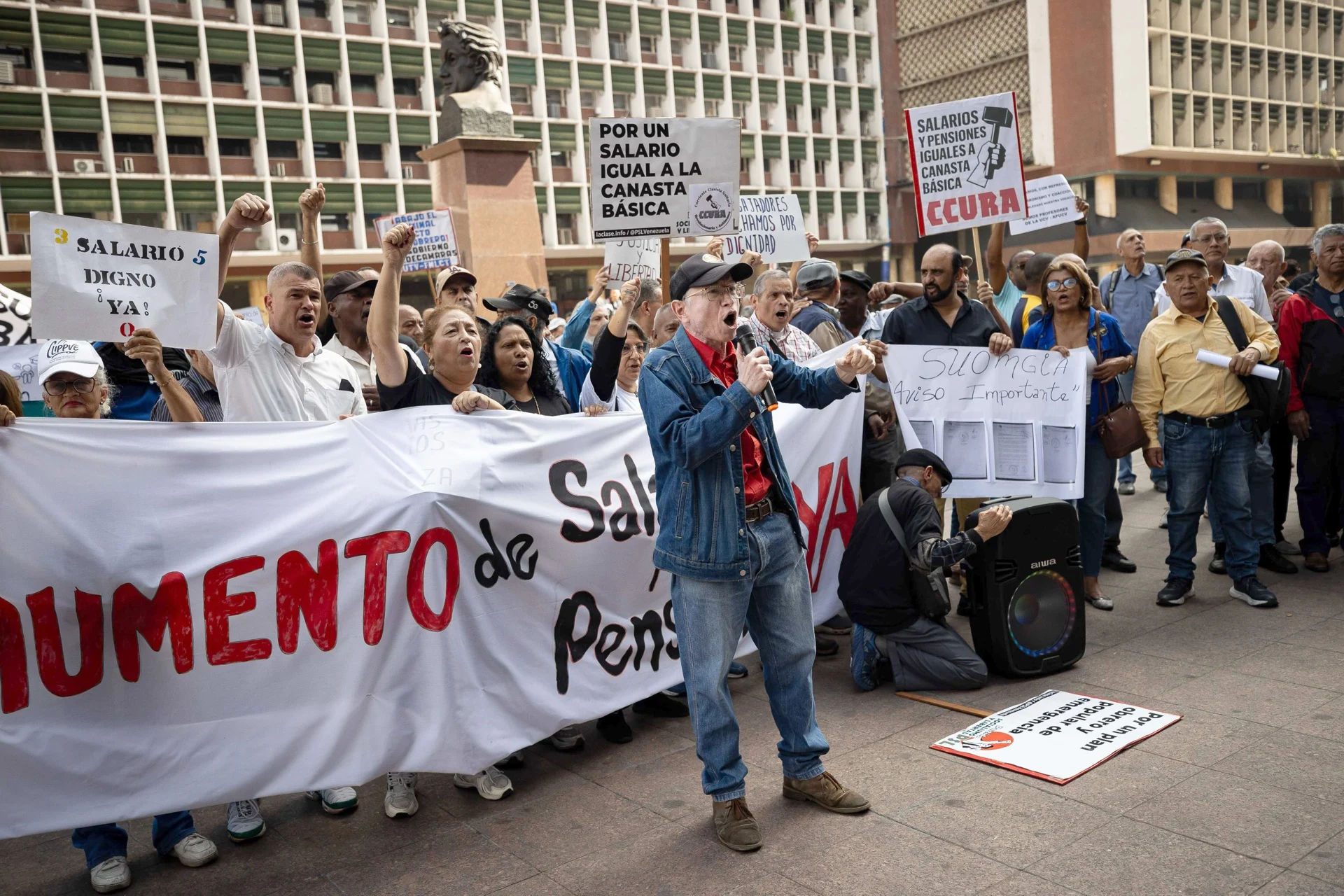Venezuelan Trade Unions Stage Nationwide Demonstrations, Demand Wage Hikes
Workers rallied in Plaza Caracas outside the Labor Ministry in the Venezuelan capital. (EFE)
Caracas, February 28, 2026 (venezuelanalysis.com) – A group of trade unions and political organizations protested outside Venezuela’s Labor Ministry headquarters in Caracas on Thursday to urge salary increases and respect for labor rights.
A crowd of around 100 people held banners expressing multiple demands, including pegging wages to a cost-of-living index.
Eduardo Sánchez, president of the Central University of Venezuela (UCV) workers’ union, told reporters that it is urgent to adjust wages and protect working-class rights ahead of announced plans to reform the country’s labor law.
“The workers here today demand an increase in their wages, not through bonuses,” he said. “We are also calling for the repeal of the Onapre and 2792 memoranda,” he added, in reference to policies implemented in 2022 and 2018, respectively, which flattened wage scales and froze a number of collective bargaining rights.
Sánchez also denounced a social media campaign “paid for by the business sector” with the purpose of “demonizing” workers’ benefits and social security.
The groups present at the rally delivered a 17-point petition addressed to Labor Minister Eduardo Piñate.
Venezuela’s monthly minimum wage was set at 130 bolívars (BsD) in March 2022 and has not been adjusted since. At the time, 130 BsD amounted to around US $30 at the time, but with the Venezuelan currency’s devaluation, it is now equivalent to $0.31.
In recent years, with the Venezuelan economy heavily battered by US sanctions, the Nicolás Maduro government has prioritized non-wage bonuses as the main income source for workers and pensioners. Public sector employees have a monthly income floor of $160 from a combined $120 economic war bonus and a $40 food bonus. They are paid in bolívars at the official exchange rate.
Public sector retirees and pensioners receive $70 and $50 economic war bonuses, respectively.
Trade unions have denounced the bonus-over-salary policies for being tailored to private sector interests, since they drastically reduce employer obligations, including social security contributions, vacation pay, severance, and other benefits.
In 2023, a group of Chavista organizations delivered a constitutional appeal before the Venezuelan Supreme Court, arguing that under Venezuelan labor law bonuses must be considered as salaries with all their implications. However, the petition received no answer from the country’s highest judicial body.
Thursday also saw activists and trade unionists hold demonstrations outside regional Labor Ministry offices in 14 Venezuelan states.
Arvilio Hidalgo, secretary general of the CUTEC trade union in Carabobo state, called on the government to “restore the infringed-upon rights of the working class.”
“Our struggle right now is to restore the minimum wage and social security,” he stated. “We are also calling for the release of workers and trade unionists who were arrested for defending labor rights.”
In recent years, trade unions and human rights groups have denounced dozens of arrests of labor leaders, claiming that they were targeted for upholding collective bargaining rights or opposing corruption in the public sector and state-owned companies. Several trade union representatives have been released in past days following the approval of the Amnesty Law.
The labor organizations that rallied on Thursday announced a new protest on March 12.
In recent months, Venezuelan authorities have announced plans to develop a “new labor model” and engaged in consultation processes with pro-government trade unions.
The country’s main business lobby, FEDECÁMARAS, has openly voiced support for an overhaul of labor legislation reform that cuts down on benefits and other employer responsibilities.
One of the core legacies of the Hugo Chávez administration, Venezuela’s Organic Law of Labor and Workers (LOTTT) was hailed as the “most advanced labour law in the world.” The historic 2012 law prohibits unfair dismissal and outsourcing, enshrines the world’s third longest maternity leave, guarantees the right to work for both women and people with disabilities, and extends retirement pensions to all workers, including full-time mothers and the self-employed.
